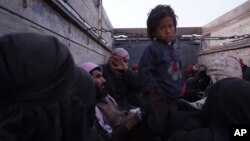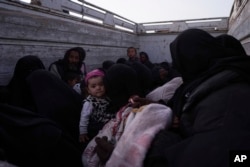Hundreds of Islamic State fighters and family members fled the northeastern Syrian village of Baghuz, taking advantage of a pause in ferocious fighting with the U.S.-backed forces that have surrounded the last patch of the terror group's self-declared caliphate.
Officials with the Syrian Democratic Forces, Kurdish militias and human right monitors confirmed the exodus late Monday, though the number of fighters and civilians varied.
Monitors with the London-based Syrian Observatory for Human Rights said about 150 IS fighters surrendered to the SDF, part of a group of about 400 people that left the ever-shrinking enclave on the banks of the Euphrates River.
The observatory said by the end of the day, as many as another 1,200 people had left.
SDF spokesman Mustafa Bali put the total number of people who have fled Baghuz since the pause in the fighting at about 3,000, tweeting that the first groups of IS fighters and civilians fled under the cover of darkness.
One official with the YPG, a Kurdish militia that has supported the U.S.-backed offensive on Baghuz, told VOA many of the fighters and family members came from Central Asian countries, such as Turkmenistan, Tajikistan and Uzbekistan. But the official said he did not know how many more fighters or civilians were still hiding in tunnels underneath the village.
SDF and coalition officials have described the tunnel system, which could extend for more than 2 kilometers, as complex, parts of it laden with explosives and booby traps as the dwindling number of IS fighters make their last stand.
Initial estimates from both the coalition and the SDF put the number of IS fighters in Baghuz at about 300, with officials warning they were some of the most dedicated and hardened fighters the terror group had to offer. Since then, though, hundreds of IS fighters have surrendered, though officials suspect many more remain.
Prior to the pause in fighting late Sunday, the fighting had been intense. SDF and coalition officials said IS used a combination of car bombs, suicide bombers and human shields to hold the advancing forces at bay.
But by late Monday, the YPG's Zana Amedi tweeted that IS control had been contained to a collection of about a dozen houses clustered near the banks of the Euphrates River.
"However, some Daesh still remain in tunnel network under the camp," he warned, using an Arabic acronym for the terror group.
The U.S.-backed SDF began their final assault on the last remnant of the Islamic State's self-declared caliphate late Friday, surrounding the village of Baghuz with about 15,000 troops and with the backing of U.S. and coalition airpower.
SDF commanders said they gave the go-ahead for their final offensive only after more than 13,000 people had evacuated Baghuz, saying they were convinced that all civilians had left the city.
Only coalition officials began expressing concern Sunday that IS fighters were making extensive use of women, children and possible hostages as human shields.
“We’re slowing down the offensive in #Baghouz due to a small number of civilians held as human shields by Daesh,” Mustafa Bali, the SDF spokesman, announced on Twitter late Sunday.
Still, he warned that the reprieve would not last long.
"We assert that the battle to retake the last ISIS holdout is going to be over soon," he wrote, using another acronym for the terror group.
A coalition official told VOA Monday that the SDF was "working diligently" to get any remaining civilians out of harms way, but admitted the number of civilians still hiding with IS fighters or being held against their will, was not known.
The United Nations has said that of the estimated 13,000 civilians who evacuated Baghuz in the week preceding the SDF offensive, as many as 90 percent of them were women and children under the age of 5.
Sirwan Kajjo contributed to this report.





